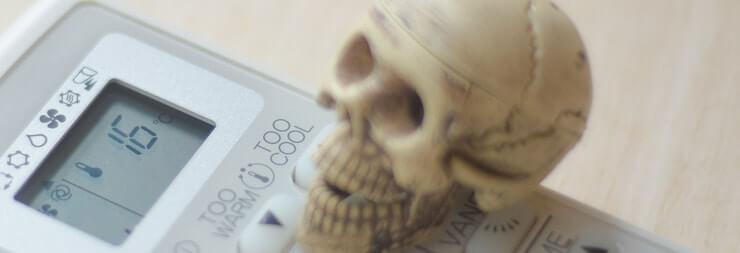Quick. What’s your favorite thing about your home? While most people would likely mention their big screen TV or the fire pit in their backyard, as a Florida resident, it’s probably the air conditioner. Not only does it cool your home in the oppressive Florida heat, but it also lowers humidity levels — keeping your family comfortable and preserving your home’s structural integrity. And, when it works efficiently, your energy bills remain at a constant, relatively reasonable amount. So if you’ve noticed that your AC keeps shutting off too often, you may be wondering what’s causing it and how to troubleshoot it.
5 Reasons Your AC Keeps Shutting Off
1. Frozen Coils
Air conditioners work by absorbing the warm air from inside your home and removing the moisture from it. Once removed, water drops fall into what’s called a drip pan. The drip pan has a float that elevates as it gathers water. Once full, the water is drained outside your home through a drain pipe. If you forget to change your air filter regularly, dirt and debris will accumulate and block airflow. When the flow is obstructed, instead of dripping into the drip pan, the water drops remain on the AC coils — eventually freezing. This comes with several issues, such as water dripping from the AC vents, higher energy bills, and an air conditioner that cycles off regularly.
2. Oversized Air Conditioner
While it’s normal for an air conditioner to cycle on and off every 15 to 20 minutes or so, it’s not ok for it to keep shutting off more regularly than that. Each home has different AC needs — depending on square footage, ceiling height, and stories. An AC’s capacity to cool a home is measured in British Thermal Units (BTUs). For each ton of heat that has to be removed, the AC requires 12,000 BTUs. The smaller your home, the lower BTUs you’ll need. You can check your unit’s BTU capacity by looking at the label on the condenser unit. At the top of the label, you’ll see the air conditioner’s model number (M/N). The model number includes three sections of numbers and letters, separated by dashes. The BTU capacity is the number included in the second section of the M/N, after the first dash.
3. Thermostat Location
When you set the thermostat, you expect the air conditioner to keep running until your home reaches the desired temperature. However, there are certain rooms in your home that could be warmer than the rest. If your thermostat is located near the kitchen, laundry room, or bathroom, it’s possible for it to do an incorrect reading of the indoor temperature and shut off much sooner than desired. To prevent this from happening, ensure it’s installed on an interior wall, preferably near an area where your family spends the bulk of their time — such as the family room, living room, or a hallway near the bedrooms.
4. Low on Refrigerant
Refrigerant is a gas that cools the warm air absorbed from your home. Typically, you won’t have to top off refrigerant levels on a regular basis. If your AC is low on the gas, it’s because there’s a leak. In addition to the system cycling off often, additional telltale signs include a hissing sound, it feels humid inside your home, there’s frost forming on the side panels of the condenser unit, the air conditioner is not cooling, or you or your family experience irritated eyes, scratchy throat, dizziness, nausea, and/or headaches. If such is the case, call an HVAC technician immediately, since a refrigerant leak could lead to poisoning.
5. Faulty Compressor
An air conditioner’s compressor turns refrigerant into a high-pressure, high-temperature gas. The refrigerant then goes through the condenser, which turns it into a cool liquid. The cool liquid enters the evaporator coils, which turn it into gas. This is what keeps your home cool. If the compressor overheats or wears out from too much wear and tear — and not enough maintenance — the air conditioner will cycle off much sooner than it should.
AC Service in Brevard County
At Colman Air, we understand that sometimes AC issues happen during the most inconvenient times. This is why we have a 24/7 AC emergency line. Call us if you need assistance ASAP, or to schedule routine HVAC maintenance.
24-HR Emergency Service: (321) 269-4565








